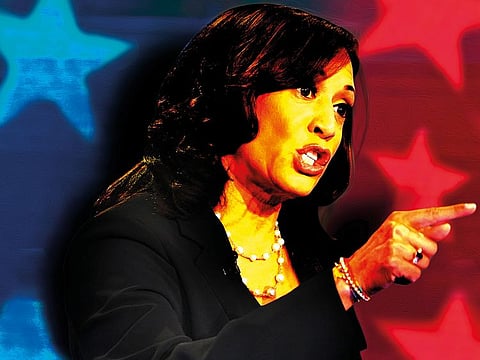How Kamala Harris can make a bigger impact in Biden presidency
Democrats should provide an alternative to populism by reigniting their rural base

The US Vice President-elect Kamala Harris is smart and energetic. President-elect Joe Biden should broaden the scope of her job: make her his de facto secretary of rural development, in charge of closing the opportunity gap, the connectivity gap, the learning gap, the start-up gap — and the anger and alienation gap — between rural America and the rest of the country.
It would provide a vision for American renewal and signal that Democrats were no longer going to cede rural America to Republicans but were instead going to seize it from them. And it would make Harris a super-relevant vice president from Day 1.
Democrats must not kid themselves. Biden won this election by narrowly winning the suburbs and urban centers in key battleground states, where just enough people decided that they wanted to “de-Trump” the White House but not “defund” the police.
Beating from suburban voters
That is, a lot of suburban voters rejected Trump personally but also rejected far-left Democratic ideas that had percolated up in the past few years. Democrats won the presidency but took a beating from those same suburban voters in many statehouse, US. House and US. Senate races.
If Democrats go into 2022 — let alone 2024 — appealing only on the cities and suburbs, they’re crazy. They will be highly vulnerable if the GOP is led by a smarter, less offensive populist than Donald Trump.
Most important, lifting rural America is the right thing to do for all of America and fulfils Biden’s vision of a nation that “grows together” in every way.
She could make herself the person in the Biden cabinet who always shows up FIRST to listen in rural America and the FIRST to appreciate its concerns and the FIRST to make sure its concerns are addressed, she and the Democrats could make themselves competitive in a lot more rural counties

That concept remains in the DNA of the Democratic Party, which in my home state, Minnesota, is still known as the “DFL” — the Democratic-Farmer-Labor Party. The party needs to reconstitute that coalition.
“One way to do that is by reconnecting with its populist roots — when it really was a party focused on the empowerment of workers and farmers and ordinary citizens,” argued Harvard’s Michael Sandel, author of “The Tyranny of Merit: What’s Become of the Common Good?” “Trump gave populism a bad name. Democrats should provide an alternative to Trump’s xenophobic, plutocratic populism by showing how populism can be a source of civic activism, engagement and renewal across urban and rural America.”
That should be Harris’ mission, and it’s one worthy of a vice president. And it starts in rural America.
Spreading connectivity and technology
“I fear the word ‘rural’ connotes a geography that is not my problem,” Beth Ford, president of Land O’Lakes, the influential farmer-owned cooperative headquartered in Minnesota, said to me. But, in fact, spreading connectivity and technology to rural America “is an American issue, an American competitiveness issue and an American national security issue,” she argued.
Persistent “underinvestment in rural America will leave us less secure and less prosperous as a nation” — and less competitive with China, which is rapidly connecting its rural heartland, Ford said. “Some 35% of farmers lack enough bandwidth to run the equipment on their farms, ensure their kids get a good education and that Grandma has access to telemedicine.”
What should a Biden-Harris rural strategy look like? It would start with showing up regularly. “Showing up” and “just listening to people” with respect goes a long way in rural America, Emily Larson, the mayor of Duluth, Minnesota, told me. Actually, nothing earns more respect than listening to people respectfully.
“Rural areas have their own social networks,” Larson said, but they’re different from the metropolitan ones. “Here, people will show up for you in the middle of the night, but they don’t post about it on Facebook.”
On policy specifics, the Biden-Harris team should commit that in four years every rural community in America will have access to broadband — the basic infrastructure needed for an inclusive modern economy.
Kamala Harris is a natural for that task. Who better to bridge Silicon Valley and the rural valleys of America?
A natural bridge builder
She is also a natural bridge builder to a more inclusive American heartland, because According to a report by the Urban Institute, “1 in 5 Americans lives in rural communities, and more than one in five (22%) rural residents are people of colour.” I wrote last year about Willmar, Minnesota, a town that was all white back in the 1950s and today is nearly half Hispanic, Somali, Asian and Native American.
In Minnesota, small towns like Willmar that can manage inclusion and diversity are the ones now thriving, because they can attract new labour and homebuyers when so many of the young white adults have left for the big cities.
Harris will soon be the first woman, the first Black and the first Indian American vice president, which certainly resonates with a lot of urban voters. However, if she could make herself the person in the Biden cabinet who always shows up FIRST to listen in rural America and the FIRST to appreciate its concerns and the FIRST to make sure its concerns are addressed, she and the Democrats could make themselves competitive in a lot more rural counties.
Even if it is just 10 or 15% more competitive, it might be enough to deprive today’s deeply warped Trump-led GOP from taking back the White House or the House in the next four years — and maybe force it back to sanity. Nothing would shock the Republican party more than losing its automatic hold on rural America.
Thomas L. Friedman is a Pulitzer prize-winning journalist and author
The New York Times







